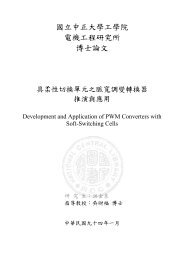Syntax of the Bi Comparative Construction in Mandarin Chinese
Syntax of the Bi Comparative Construction in Mandarin Chinese
Syntax of the Bi Comparative Construction in Mandarin Chinese
Create successful ePaper yourself
Turn your PDF publications into a flip-book with our unique Google optimized e-Paper software.
<strong>Syntax</strong> <strong>of</strong> <strong>the</strong> <strong>Bi</strong> <strong>Comparative</strong> <strong>Construction</strong> <strong>in</strong> Mandar<strong>in</strong> Ch<strong>in</strong>ese<br />
b. Zhangsani [bi Lisij _____ ] geng ai zijii/*j<br />
Zhangsan COM Lisi more love oneself<br />
(95) a. ta zuotian zai xuexiao bi [wo j<strong>in</strong>tian zai jiali] gaox<strong>in</strong>g<br />
s/he yesterday at school COM I today at home] happy<br />
‘S/He was happier at school yesterday than I am at home today.’<br />
Moreover, both English and MC have <strong>the</strong> close historical relation between a<br />
complementizer and a preposition. The words before, after, and for are <strong>the</strong> examples<br />
<strong>in</strong> English (96), while y<strong>in</strong>wei ‘because’ and jiaru ‘if’ are <strong>the</strong> examples <strong>in</strong> MC (97).<br />
(96) a. After graduation, he went abroad.<br />
b. After he graduated, he went abroad.<br />
(97) a. y<strong>in</strong>wei zhe jian shi, ta shou dao biaoyang<br />
because this CL event he accept to praise<br />
‘Because <strong>of</strong> this event, he was praised.’<br />
b. y<strong>in</strong>wei tianqi buhao, women quxiao huodong<br />
because wea<strong>the</strong>r bad we cancel activity<br />
‘Because <strong>the</strong> wea<strong>the</strong>r was bad, we cancel <strong>the</strong> activity.’<br />
In (96a), <strong>the</strong> word after functions as a preposition takes <strong>the</strong> nom<strong>in</strong>al graduation. But,<br />
<strong>in</strong> (96b) <strong>the</strong> word after is called a subord<strong>in</strong>ate conjunction <strong>in</strong> traditional grammars,<br />
which jo<strong>in</strong>s <strong>the</strong> two clauses toge<strong>the</strong>r. It is a complementizer <strong>in</strong> generative approaches.<br />
Similarly, <strong>in</strong> MC, y<strong>in</strong>wei is a preposition <strong>in</strong> (97a), but it is a complementizer <strong>in</strong> (97b).<br />
It seems that, complementizers <strong>in</strong> MC have a pretty close relationship with<br />
58<br />
中正大學 e-Thesys (94 學年度)





